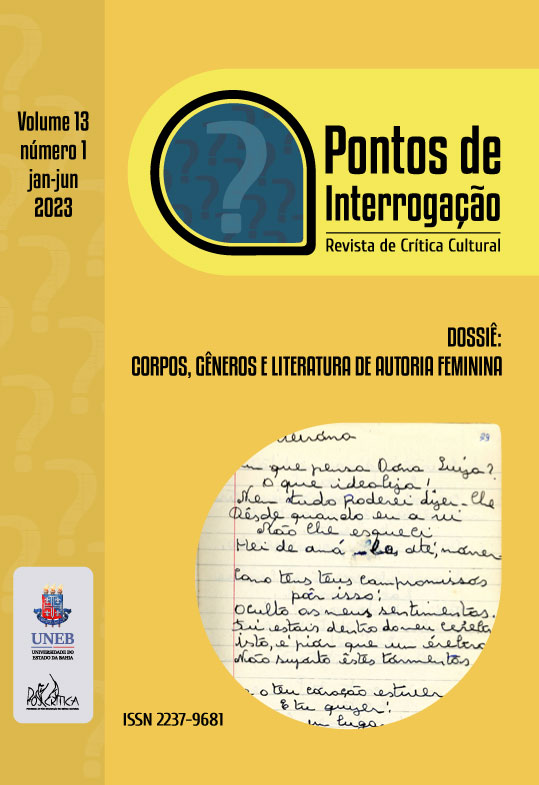Japanese-Brazilian women writers and japanese aesthetic values in contemporary brazilian literature
DOI:
https://doi.org/10.30620/pdi.v13n1.p169Keywords:
Japanese Brazilian Literature, Japanese aesthetic values, Mono no aware, Brazilian literary fieldAbstract
This article focus on the relationship between the literary production of Japanese Brazilian female writers and the influence of traditional Japanese aesthetic values present in contemporary Brazilian prose and poetry. The literary analysis of the works Desafio ao Imortal (1970), by Eico Suzuki; Velas ao Vento (2020), by Marília Kubota, and Sonhos Bloqueados (1991), by Laura Honda-Hasegawa, will be based on four elements that permeate the Japanese artistic expressions: simplicity, irregularity, suggestion, and perishability, which guide the aesthetic value known as mono no aware, that is, the sensitivity for appreciating things. Finally, the study examines the concepts of Keene (1969, cited in SORTE JUNIOR, 2018), and Diogo Porto (2016), as well as presents a perception that Japanese Brazilian authorship has been a point of divergence in the literary field itself.
[Received on: March 7, 2023 - Accepted on: June 10, 2023]
Downloads
References
HONDA-HASEGAWA, Laura. Sonhos Bloqueados. São Paulo: Estação Liberdade, 1991.
KEENE, Donald. Anthology of Japanese Literature: from the Earliest Era to the MidNineteenth Century. In: SORTE JUNIOR, Waldemiro Francisco. Uma análise de valores estéticos japoneses do período heian: miyabi e mono no aware. Estudos Japoneses, n. 40, p. 81-100, 2018. Disponível em: https://www.revistas.usp. br/ej/article/view/159798. Acesso em: 04 jul. 2022.
KEMPTON, Beth. Wabi sabi. [tradução de Carolina Leocadio, Patrícia Azeredo]. Rio de Janeiro: BestSeller, 2018.
KUBOTA, Marília. Velas ao vento. Curitiba: Editora Medusa, 2020.
NAGAE, Neide Hissae. A voz narrativa e os poemas nos diários literários japoneses Tosa Nikki e Izumi Shikibu Nikki. Estudos Japoneses, n. 27, p. 141-162, 2007. Disponível em: https://www.revistas.usp. br/ej/article/view/141796. Acesso em: 14 jul. 2022.
ÔNISHI, Yoshinori. Aware. In: MARRA, Michele. Modern Japanese Aesthetics: A Reader. Honolulu: University of Hawaii Press, p. 122-140, 2002.
OKAKURA, Kakuzo. O livro do chá. [tradução de Leiko Gotoda]. 4ª Ed. São Paulo: Estação Liberdade, 2017.
PORTO, Diogo da Silva. Mono no Aware e sua relevância filosófica: a melancolia na poética japonesa. In: Freitas, Verlaine; Costa, Rachel; Ferreira, Debora Pazetto. (Org.). O trágico, o sublime e a melancolia. 1ª ed.Belo Horizonte: ABRE Associação Brasileira de Estética, 2016, v. 4, p. 61-79.
SUZUKI, Eico. Desafio ao Imortal. São Paulo: Editora do Escritor, 1970.
Published
How to Cite
Issue
Section
License
Copyright (c) 2023 Pontos de Interrogação – Journal of Cultural Criticism

This work is licensed under a Creative Commons Attribution-ShareAlike 4.0 International License.
Autores que publicam nesta revista concordam com o seguinte termo de compromisso:
Assumindo a criação original do texto proposto, declaro conceder à Pontos de Interrogação o direito de primeira publicação, licenciando-o sob a Creative Commons Attribution License, e permitindo sua reprodução em indexadores de conteúdo, bibliotecas virtuais e similares. Em contrapartida, disponho de autorização da revista para assumir contratos adicionais para distribuição não-exclusiva da versão do trabalho publicada, bem como permissão para publicar e distribuí-lo em repositórios ou páginas pessoais após o processo editorial, aumentando, com isso, seu impacto e citação.























